Dallas Woodburn's Blog, page 23
February 12, 2011
Guest Post by Magdalena Ball
The Zen of Rejectionby Magdalena Ball
It couldn't have happened at a worse moment. My car had just been hit side-on by a truck, and I was standing amidst the wreckage of glass and metal when the local mail lady pulled up. After ascertaining that I wasn't hurt, she handed me a package: the obvious thick SASE that went along with my novel's manuscript. I was being rejected again, and this time by the small local publishing house I thought would definitely take the novel.
I'm not sure which hurt more -- the loss of my lovely vehicle, or the final rejection of the novel. Both hurt, but in the aftermath that followed, I'm sure it was my manuscript I was primarily thinking of. After all, I had won a mentorship for this work, and my mentor, a multi-published novelist, told me that the work was publishable and ready for submission. I'm not naïve about the difficulties of getting a first novel published, but I did begin the submission process in a hopeful state of mind.
It wasn't all bad news though. Although I did receive a few form letters ("due to the volume of submissions, we regret that we are unable to provide feedback, etc"), many of my rejections, including those from large houses, were very positive, and cited the quality of the writing, the strength of the characterisations, and the powerful nature of the plot, using words like "heart-wrenching," "complex," and "rich." Many also suggested that the sluggish market for fiction, especially literary fiction, meant that to be accepted, a novel had to be perfect, startlingly good, and possess a fairly strong commercial angle.
Mine was apparently good, just not good enough.
The criticism received was very thorough in some cases, and provided specific examples where the work could be strengthened, and once I was over the sting, I began to feel grateful to those professional readers, who had taken such trouble over my manuscript, and who were unwilling to accept a novel which hadn't reached its complete potential. I am after all, the author, and the books I write set benchmarks which my readers will judge me by. The quality of the work is really all that counts. Everything else is just ego and transition.
I have heard many people, authors and publishers alike, bemoan the state of publishing, and criticise the overtly commercial world which seems to be focused solely on profit. It's a natural defence mechanism and one which I have been tempted to participate in. After all, it's so much easier to blame my rejection on "the state of publishing today" than on the work. However, looking back over the novel, and reading through the criticisms, I began to believe that the comments were both generous and valid. I was heartened by the full scale and thoughtful reading which even the most commercial of publishers gave my work, taking it seriously and taking the time to provide real feedback. I rarely encountered the dreaded slush pile, and was taken seriously, without an agent, by almost all the publishers I submitted to.
The process also helped me appreciate, and this is certainly part of the tremendous learning curve that goes along with writing a full length novel, just how much hard work -- not inspiration, just graft -- is involved in taking a novel from sketchy draft to full scale polished work of art. The book was ultimately published, by a picky, high quality traditional publisher, but only after multiple re-writes. I believe strongly that this is the most important part of the writing process – where a piece of work goes from being okay to being really professional. It's not just painful – it's also utterly necessary and work that doesn't get worked on extensively, and with multiple inputs, can't reach its full potential.
I've always loved fiction, even more as a reader than as a writer, but writing my own novel and seeing just how much crafting is involved in the books I love, read and re-read, has made me appreciate even more what a wonderful and powerful art fiction writing is. There's no point in sobbing, or putting the work away in a drawer forever, shunning further rejection. It's all part of the game; the very reason why great literature exists. Good novels take time and a tremendous amount of work, and in the end, the speed and ease of publication is the one thing which readers and critics will ignore. This is no easy lesson for an impatient writer used to fairly instant gratification. But it's a lesson worth learning. Every rejection is another part of the process, and to be welcomed and embraced.
So what can you do if, like me, you receive your 20th rejection and begin to wonder if you'll just print up an e-book as is and sell it from your website, or leave the work sitting in the dark unread caverns of your computer's hard disk for the rest of your life? The answer is simple and almost too obvious. Ask for help from a cluey editor, gather in the criticism, and get back to work. At the end of the day, you'll be grateful that you took the time to make the work shine. And so will your readers. It's all part of becoming an overnight success story (and if you don't believe me, ask JK Rowling or John Grisham – both famous for the number of rejections they got on their early books).
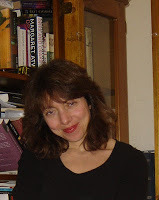 Magdalena Ball runs The Compulsive Reader. She is the author of the poetry books Repulsion Thrust and Quark Soup, the novel Sleep Before Evening, a nonfiction book The Art of Assessment, and, in collaboration with Carolyn Howard-Johnson, Blooming Red, Cherished Pulse, She Wore Emerald Then, and Imagining the Future. She also runs a radio show, The Compulsive Reader Talks. Find out more about Magdalena at http://www.magdalenaball.com.
Magdalena Ball runs The Compulsive Reader. She is the author of the poetry books Repulsion Thrust and Quark Soup, the novel Sleep Before Evening, a nonfiction book The Art of Assessment, and, in collaboration with Carolyn Howard-Johnson, Blooming Red, Cherished Pulse, She Wore Emerald Then, and Imagining the Future. She also runs a radio show, The Compulsive Reader Talks. Find out more about Magdalena at http://www.magdalenaball.com.
Tomorrow, February 13, my writing buddy Steven Tremp is being featured on Karen Cioffi's blog -- check it out! http://karenandrobyn.blogspot.com

It couldn't have happened at a worse moment. My car had just been hit side-on by a truck, and I was standing amidst the wreckage of glass and metal when the local mail lady pulled up. After ascertaining that I wasn't hurt, she handed me a package: the obvious thick SASE that went along with my novel's manuscript. I was being rejected again, and this time by the small local publishing house I thought would definitely take the novel.
I'm not sure which hurt more -- the loss of my lovely vehicle, or the final rejection of the novel. Both hurt, but in the aftermath that followed, I'm sure it was my manuscript I was primarily thinking of. After all, I had won a mentorship for this work, and my mentor, a multi-published novelist, told me that the work was publishable and ready for submission. I'm not naïve about the difficulties of getting a first novel published, but I did begin the submission process in a hopeful state of mind.
It wasn't all bad news though. Although I did receive a few form letters ("due to the volume of submissions, we regret that we are unable to provide feedback, etc"), many of my rejections, including those from large houses, were very positive, and cited the quality of the writing, the strength of the characterisations, and the powerful nature of the plot, using words like "heart-wrenching," "complex," and "rich." Many also suggested that the sluggish market for fiction, especially literary fiction, meant that to be accepted, a novel had to be perfect, startlingly good, and possess a fairly strong commercial angle.
Mine was apparently good, just not good enough.
The criticism received was very thorough in some cases, and provided specific examples where the work could be strengthened, and once I was over the sting, I began to feel grateful to those professional readers, who had taken such trouble over my manuscript, and who were unwilling to accept a novel which hadn't reached its complete potential. I am after all, the author, and the books I write set benchmarks which my readers will judge me by. The quality of the work is really all that counts. Everything else is just ego and transition.
I have heard many people, authors and publishers alike, bemoan the state of publishing, and criticise the overtly commercial world which seems to be focused solely on profit. It's a natural defence mechanism and one which I have been tempted to participate in. After all, it's so much easier to blame my rejection on "the state of publishing today" than on the work. However, looking back over the novel, and reading through the criticisms, I began to believe that the comments were both generous and valid. I was heartened by the full scale and thoughtful reading which even the most commercial of publishers gave my work, taking it seriously and taking the time to provide real feedback. I rarely encountered the dreaded slush pile, and was taken seriously, without an agent, by almost all the publishers I submitted to.
The process also helped me appreciate, and this is certainly part of the tremendous learning curve that goes along with writing a full length novel, just how much hard work -- not inspiration, just graft -- is involved in taking a novel from sketchy draft to full scale polished work of art. The book was ultimately published, by a picky, high quality traditional publisher, but only after multiple re-writes. I believe strongly that this is the most important part of the writing process – where a piece of work goes from being okay to being really professional. It's not just painful – it's also utterly necessary and work that doesn't get worked on extensively, and with multiple inputs, can't reach its full potential.
I've always loved fiction, even more as a reader than as a writer, but writing my own novel and seeing just how much crafting is involved in the books I love, read and re-read, has made me appreciate even more what a wonderful and powerful art fiction writing is. There's no point in sobbing, or putting the work away in a drawer forever, shunning further rejection. It's all part of the game; the very reason why great literature exists. Good novels take time and a tremendous amount of work, and in the end, the speed and ease of publication is the one thing which readers and critics will ignore. This is no easy lesson for an impatient writer used to fairly instant gratification. But it's a lesson worth learning. Every rejection is another part of the process, and to be welcomed and embraced.
So what can you do if, like me, you receive your 20th rejection and begin to wonder if you'll just print up an e-book as is and sell it from your website, or leave the work sitting in the dark unread caverns of your computer's hard disk for the rest of your life? The answer is simple and almost too obvious. Ask for help from a cluey editor, gather in the criticism, and get back to work. At the end of the day, you'll be grateful that you took the time to make the work shine. And so will your readers. It's all part of becoming an overnight success story (and if you don't believe me, ask JK Rowling or John Grisham – both famous for the number of rejections they got on their early books).
 Magdalena Ball runs The Compulsive Reader. She is the author of the poetry books Repulsion Thrust and Quark Soup, the novel Sleep Before Evening, a nonfiction book The Art of Assessment, and, in collaboration with Carolyn Howard-Johnson, Blooming Red, Cherished Pulse, She Wore Emerald Then, and Imagining the Future. She also runs a radio show, The Compulsive Reader Talks. Find out more about Magdalena at http://www.magdalenaball.com.
Magdalena Ball runs The Compulsive Reader. She is the author of the poetry books Repulsion Thrust and Quark Soup, the novel Sleep Before Evening, a nonfiction book The Art of Assessment, and, in collaboration with Carolyn Howard-Johnson, Blooming Red, Cherished Pulse, She Wore Emerald Then, and Imagining the Future. She also runs a radio show, The Compulsive Reader Talks. Find out more about Magdalena at http://www.magdalenaball.com.Tomorrow, February 13, my writing buddy Steven Tremp is being featured on Karen Cioffi's blog -- check it out! http://karenandrobyn.blogspot.com
Published on February 12, 2011 00:00
February 3, 2011
Interview with Jennifer Probst
 Yesterday, we featured an interview with young author Taylor Probst. Today, in Part 2 of our feature, we talk with Taylor's aunt Jennifer, who is a successful romance author. Welcome, Jennifer!
Yesterday, we featured an interview with young author Taylor Probst. Today, in Part 2 of our feature, we talk with Taylor's aunt Jennifer, who is a successful romance author. Welcome, Jennifer!What would you like readers to know about you as an introduction?
I have always known I wanted to be a writer, and started spinning high school romance tales when I was a pre-teen. My journey has been filled with hard work, rejections, and seeing my dreams of being published come true. Along the way, I had my own happily-ever-after when I met my husband and had two beautiful boys. Now, the writing is a bit harder to accomplish, my life is chaotic, and my house is never clean, but it's so worth it!
You have been writing since you were a kid and have had much success as a writer yourself. How does it feel to now see your niece Taylor blossom as a writer?
Watching my niece create a story and see it develop into print is an amazing experience. She is like my daughter, and I am so proud of what she has accomplished. She's learned a lot about working hard and not giving up on what she wants. Watching someone you love grow into a beautiful young woman is a humbling experience.
How did you first get started writing?
I knew my whole life. When I was in sixth grade, we had to complete a career report and I did mine on being a writer. I wrote teen romances and read them to my friends, and passed them around school. It was only a matter of time before I began seriously submitting to publishers and honing my craft.
What is your writing process like? Do you write on a computer? In a spiral notebook?
I am only comfortable writing on the computer because I type an insane amount of words per minute, and my fingers can't keep up with my brain if I'm writing longhand. I don't have a set writing schedule -- with a hectic household I write any time I can squeeze in a moment.
I'm assuming that helping Taylor write and publish Buffy and The Carrot was a much different experience than when you write your novels. Can you talk about this a bit?
Absolutely. I have been published in the romance market and am comfortable with the environment. I never ventured into the children's market but after my boys were born, I thought I would try if I found a great story. Once Taylor told me the story of Buffy, I knew it was special. We sat together one morning in the diner over breakfast and we wrote out the story longhand on the back of a placemat -- she had only the verbal version at the time. Then we agreed we would try to get it published. She was involved in every step of the way: editing, deciding on illustrations and what she imagined Buffy looking like, the cover, etc.
Again, writing a book and publishing one is a very different experience. I sent out a few queries for the book but received rejections. I then contacted Strategic Publishing about their program and found it a perfect fit. They accepted the book and we all agreed to publish the book in a more non-traditional way. Then we needed an illustrator and my best friend's husband is a fantastic artist. He agreed to do the illustrations so I feel like the book is almost a family event.
What have you learned or been reminded of about writing from Taylor?
The story is the most important. Tell a great story and the possiblities are endless. Marketing and agents and sales are important but she reminded me to go back to basics.
How do you get ideas for what you write?
Everywhere. I have a long commute to work so I do a lot of daydreaming. As a writer, I believe ideas lurk in every corner of the world -- it is our job to unearth them. Every conversation or encounter is the idea for a story. You just need to find the one that is interesting enough for you at the time. That will change as life progresses.
What is your biggest advice for young people reaching for their dreams?
Believe in yourself. If you have a dream, work hard and go after it. There will be a million people ready to tell you to give up -- rejection is everywhere. Dig deep and believe you can do it and the possibilities are endless. People used to pat my head and call my writing a "nice little hobby." I received tons of rejections but I dug deep and kept trying. Eventually, I found an editor who loved my voice. It's a long journey and it's hard, but if you do the work and don't give up, I believe you will get there.
Is there anything else you would like to add?
Competition is fierce and the market changes on a dime. Write what you want. Write your dream -- the book you believe in and has to be written. If you can't sell it, write another one. I had to write five full length novels before I got published. It's the journey that is everything -- not the goal. Sure, it's wonderful being published but it's not the end of your career -- only the beginning.
Young adults need to be encouraged to love books and write what they want. We need to encourage them every step of the way.
Dallas, on a side note, you are an inspiration to many people out there and I really aprpeciate being able to be on your blog.
Happy writing, everyone!
Contact Jennifer:
Website: http://www.jenniferprobst.comBlog: http://jenniferprobst.wordpress.comOrder Buffy and the Carrot: http://www.strategicpublishinggroup.com/title/BuffyAndTheCarrot.html
Published on February 03, 2011 06:11
February 1, 2011
Interview with Young Author Taylor Probst
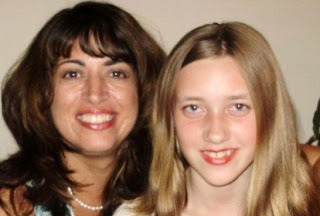 (Taylor, right, and her aunt Jennifer, who helped her publish her book.)
(Taylor, right, and her aunt Jennifer, who helped her publish her book.) Taylor Probst is a junior high student who loves reading and writing -- especially fantasy, she says. Her first book, Buffy and the Carrot, has just been published by Strategic Publishing Group. Taylor was kind enough to take some time to answer some questions about what it is like to be a twelve-year-old author!
Tell us about Buffy and the Carrot. What was your inspiration behind writing this book?
My inspiration to write this book was my two little sisters and my two cousins who begged me to tell them a funny story. I wanted to make them laugh, so I made up the story of Buffy and the Carrot. They loved it and started to spread the story around. Then my aunt encouraged me to make it a real book so we can share it with other children.
What have you learned through writing this book?
I've learned how hard it is to write a book and that it doesn't happen overnight. Writing and getting a book published is a lot of work!
How did you get started writing?
I always loved hearing and listening to great stories, and like to make them up. I'm always begging my parents or aunt or uncle to tell me stories about when they were young, especially the mischief they got into! This led me to wanting to make stories of my own up and write them down.
What is your writing process like? Do you write on a computer? In a spiral notebook? Do you draw illustrations?
I usually make up a story in my head and if it sticks with me, then I write it down. I use a notebook or talk into a tape recorder. I'm not the best artist but I like to draw pictures to match the story also.
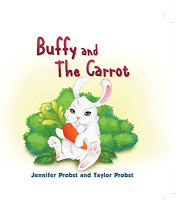 How do you get ideas for what you write?
How do you get ideas for what you write?I look at pictures and things happening around me. All the sounds and sights around me can inspire a story. I start with a character that is interesting and try to make a story around that character.
What is your biggest advice for other young people reaching for their dreams?
Go for it. If you have a great story, just try writing it. If it doesn't work out, at least you get to say you tried.
What are some of your favorite books?
I love Judy Blume. It's Not the End of the World was a great book since my parents are divorced. And I love Are You There God? It's Me, Margaret. I also love fantasy and am currently reading The Crystal Shard by R. A. Salvatore. It's wonderful.
Is there anything else you would like to add?
If a twelve year old can write a book, anybody can accomplish a goal or a dream. Never give up and don't be afraid to ask for help along the way.
Come back tomorrow to read our interview with Taylor's aunt, Jennifer Probst, who helped Taylor publish Buffy and the Carrot!
Get your own copy of Buffy and the Carrot here: http://www.strategicpublishinggroup.com/title/BuffyAndTheCarrot.html
It is also available at www.amazon.com or http://search.barnesandnoble.com.
Wholesalers please email BookOrder@AEG-Online-Store.com.
Published on February 01, 2011 06:33
January 23, 2011
Michael L. Printz Award Winners Announced
Looking for a good book? Look no further -- the 2011 Michael L. Printz Award Winners have been announced! This award was first given in 2000 and recognizes "literary excellence in young adult literature." It is named to honor Michael L. Printz, a school librarian from Topeka, Kansas who was a long-time active member of the Young Adult Library Services Association.
 This year's winner is Ship Breaker by Paolo Bacigalupi.
This year's winner is Ship Breaker by Paolo Bacigalupi.
Near a drowned New Orleans ravaged by hurricanes and global warming, Nailer and his young crew eke out a meager existence by scavenging materials on the ship-littered coast.
"This taut, suspenseful novel is a relentless adventure story featuring nuanced characters in thought-provoking conflicts. Bacigalupi artfully intertwines themes of loyalty, family, friendship, trust and love." -- Printz Award Committee Chair Erin Downey Howerton.
Four Printz Honor Books were also named:
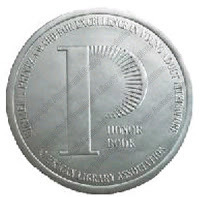 Stolen by Lucy Christopher
Stolen by Lucy Christopher
The rugged Australian outback becomes Gemma's prison after she is drugged and abducted by a handsome, obsessed stranger in a first novel filled with searing imagery and archetypal characters.
Please Ignore Vera Dietz by A.S. King
Vera Dietz wants to be ignored, but the ghost of her ex-best friend won't leave her alone in this dark comedy that examines relationships, identity, grief and flowcharts.
Revolver by Marcus Sedgwick
In Sedgwick's grim, chilling story set in the Arctic Circle, Sig finds his father's frozen corpse as human predator Wolff arrives seeking retribution and a hidden Gold Rush treasure.
Nothing by Janne Teller
Pierre Anthon's nihilism causes his classmates to begin a search for life's meaning in this bold, unsettling parable translated from Danish.
Learn more at: www.ala.org/yalsa/printz
You can order the books here: http://www.amazon.com/gp/feature.html/ref=pe_125220_18258030_pe_004/?docId=1000467281
 This year's winner is Ship Breaker by Paolo Bacigalupi.
This year's winner is Ship Breaker by Paolo Bacigalupi.Near a drowned New Orleans ravaged by hurricanes and global warming, Nailer and his young crew eke out a meager existence by scavenging materials on the ship-littered coast.
"This taut, suspenseful novel is a relentless adventure story featuring nuanced characters in thought-provoking conflicts. Bacigalupi artfully intertwines themes of loyalty, family, friendship, trust and love." -- Printz Award Committee Chair Erin Downey Howerton.
Four Printz Honor Books were also named:
 Stolen by Lucy Christopher
Stolen by Lucy Christopher The rugged Australian outback becomes Gemma's prison after she is drugged and abducted by a handsome, obsessed stranger in a first novel filled with searing imagery and archetypal characters.
Please Ignore Vera Dietz by A.S. King
Vera Dietz wants to be ignored, but the ghost of her ex-best friend won't leave her alone in this dark comedy that examines relationships, identity, grief and flowcharts.
Revolver by Marcus Sedgwick
In Sedgwick's grim, chilling story set in the Arctic Circle, Sig finds his father's frozen corpse as human predator Wolff arrives seeking retribution and a hidden Gold Rush treasure.
Nothing by Janne Teller
Pierre Anthon's nihilism causes his classmates to begin a search for life's meaning in this bold, unsettling parable translated from Danish.
Learn more at: www.ala.org/yalsa/printz
You can order the books here: http://www.amazon.com/gp/feature.html/ref=pe_125220_18258030_pe_004/?docId=1000467281
Published on January 23, 2011 14:41
January 18, 2011
Interview with YA Author Evelyn Krieger
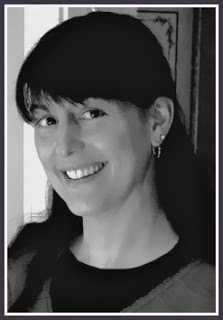 Evelyn Krieger, the oldest of six children, grew up in Detroit, Michigan. As a child, she entertained her friends with imaginative stories and dance performances. In fact, she says, the inspiration for her first poem came in the middle of the night when she was just eight years old. Evelyn has been writing ever since, and her essays and stories have won numerous awards. After studying ballet seriously, and earning her master's degree from Harvard, Evelyn worked as a reading teacher and private tutor. Today, she is a writer, learning specialist, and a homeschooling mom. Evelyn lives in the Boston area with her husband and three children. She was kind enough to drop by the blog today to answer some questions about her new novel from YM Publishing, One is Not a Lonely Number, which recently won a Sydney Taylor Honor Award from the Association of Jewish Libraries. Congrats, Evelyn!
Evelyn Krieger, the oldest of six children, grew up in Detroit, Michigan. As a child, she entertained her friends with imaginative stories and dance performances. In fact, she says, the inspiration for her first poem came in the middle of the night when she was just eight years old. Evelyn has been writing ever since, and her essays and stories have won numerous awards. After studying ballet seriously, and earning her master's degree from Harvard, Evelyn worked as a reading teacher and private tutor. Today, she is a writer, learning specialist, and a homeschooling mom. Evelyn lives in the Boston area with her husband and three children. She was kind enough to drop by the blog today to answer some questions about her new novel from YM Publishing, One is Not a Lonely Number, which recently won a Sydney Taylor Honor Award from the Association of Jewish Libraries. Congrats, Evelyn! What was your inspiration for One Is Not A Lonely Number?
I've worked as a teacher for many years, both in the classroom and privately. I watched so many kids struggle with math that it got me wondering about the best way to help kids not only get it but like it. I wanted my main character to have a friendly and interesting relationship to numbers. I am also the eldest of six kids, so I sometimes wondered what it would be like to be an only child, like Talia, the book's narrator. The story really unfolded from my imagination, though I did draw things from my life such as dance, Jewish culture, and an adopted Chinese girl (my beautiful niece.)
How did you first get started writing?
As a young child, I had a lot of trouble falling asleep. So I'd lay there making up stories and poems. Eventually I started writing them down and sharing them with my parents and friends. My mother is a natural storyteller and I think I inherited that gene. I told the best ghost stories at sleepover parties. My mother wrote poetry and articles for newspapers. That was my introduction to writing as a business. Today, I still have trouble sleeping and often get my best ideas in the middle of the night.
How do you balance everything in your life?
I am a juggler. I always have about five balls in the air and this makes life both interesting and a bit chaotic. For example, I homeschool my seventh-grade daughter, work part-time as a reading specialist, teach a weekly adult ballet class, help my teen daughter manage her magazine business, in addition to writing. Whew! I always have been a person who does too much, but I never know what I can cut out. Writing is my passion, though, and I hope to bring that in the forefront of my life.
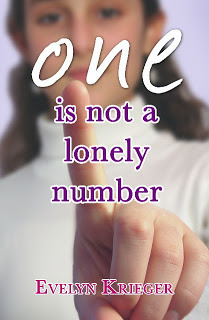 What is your writing process like? Do you write on a computer? In a spiral notebook? Do you draw illustrations?
What is your writing process like? Do you write on a computer? In a spiral notebook? Do you draw illustrations?I can no longer write in a notebook, although I love to buy pretty ones for brainstorming and list making. My hands can't keep up with my thoughts, so a computer is a must. (I type very fast.) I love my laptop. Once I have an idea, I let it roam around in my mind. I begin to hear snippets of dialogue. I can actually write parts of the story in my head. Sometimes, it even feels like I'm in a trance! (This probably explains why I often miss exits while driving on highways.) Once I start writing, I have to force myself to let the story unfold. Since I get frustrated when something doesn't sound right and I start rewriting. I think it's really essential to allow yourself to create a messy, imperfect first draft, even though I don't always practice that. I like to let my first draft sit for a few days and then I come back to it with fresh eyes. I do several rewrites, even many months later on stories or essays I thought were finished.
I used to need a lot of quiet to write, but more recently I find I work better sitting in Barnes & Nobles or a coffee shop. I write Sunday afternoons, some evenings, and during my daughter Audrey's ballet lessons.
I read that you have had years of serious ballet study. How have other art forms, such as dance, influenced your writing?
I used to be a very shy child. That's why my mother first enrolled me in ballet. Turns out, I had a natural talent and I grew to love it. Ballet study develops discipline which is essential to being a writer. It isn't enough to just want to be a writer, you have to put the time in. You have to show up at your writing space and get to work. My mother was a singer and gifted pianist. I grew up with all types of music playing in the house -- gypsy songs, Broadway, classical. I also studied piano, which like dance and writing, takes regular practice for you to get good at it. I am very affected by music. I sometimes use it to evoke a certain mood in my writing. When I was working on One Is Not A Lonely Number, I had a particular song that I listened to during a pivotal scene. Dance and music are woven into the book's plot.
What did you learn from writing One Is Not A Lonely Number?
I learned that I had the ability to actually finish a novel! When you have three unfinished novels on your computer, you get discouraged. For some reason, I found writing for young people more freeing. I took it chapter by chapter, without letting myself get overwhelmed by the idea of writing a WHOLE book.

What are you working on now?
I'm a big contest fan. I like entering writing competitions because they give me a specific goal to work towards... and a deadline! I also love a challenge. When I am not busy promoting One Is Not A Lonely Number, I am working on essays and short story contests, and pitching article ideas to magazines. However, I will reveal, and your blog will be the first to know, that I have a new novel growing in my head -- a contemporary story for adults. I'm very excited by the idea, but also frustrated because I really don't have the time to pursue it right now. I'm sure looking forward to the summer when I can let the characters out to play.
Thank you so much for sharing the news about your next novel -- how exciting! What is your biggest advice for young people reaching for their dreams?
Write them down. Something powerful happens when you commit your dreams to paper. Then, list steps that you need to take to make them come true. Review your dreams on your birthday each year.
Is there anything else you'd like us to know?
I'd love to hear from readers! Are you an Only? A dancer? A "mathlete"? Write to me. Please check out the publisher's website for an excerpt, reviews, and more. My very talented teen daughter created it. www.oneisnotalonelynumber.com
Below is the book trailer for One is Not a Lonely Number:
Published on January 18, 2011 00:56
January 13, 2011
Sticking With Your New Year's Goals

So it's two weeks into a glorious new year. How is 2011 going for you so far? How are those new year's goals and resolutions holding up?
To really make a new habit stick, I've heard that you need to do it consistently for three weeks, and then it much more likely to be a permanent part of your routine.
But, as we all know, new habits set with the best of intentions can be difficult to stick to. Especially in the hectic weeks of a new year after coming back from a holiday break. Especially in the frigid January snow. Especially when there are so many other, important things clamoring for your attention.
I'm a big believer in daily goals, and I'm also a big believer in baby steps. Break down something that seems huge into small steps you can take every day. Just do a little bit every day. Consistently. Baby steps add up to huge accomplishments.
Here's a motivation tool I found, courtesy of the wonderful positive-news site Gimundo, that has been helping me with my goal of writing a certain number of words every day: Joe's Goals. It's supposedly inspired by a motivation concept of Jerry Seinfeld, with the simple idea: Don't break the chain. You enter a goal you want to do consistently -- every day, three times a week, etc -- and it is marked down on this calendar for you. Every day, if you do the goal, you get to check it off. Your checks soon become a chain of happy green check marks, and the last thing you want to do is "break the chain" and have to start all over again! It sounds simple, but it has really helped me stay on top of my writing goal so far.
Case in point: last night, I got home late, and I hadn't written enough yet for my word count goal, so I plunked down in front of my computer and wrote some before I went to bed. All so I could truthfully have that little green check mark. If not for that website, I very likely would have thought, I'll just write more tomorrow. But, as my role model Coach Wooden used to say, "You can't do anything about yesterday, and the only way to improve tomorrow is by what you do right now. We kid ourselves: 'I'll buckle down tomorrow and work twice as hard.' No. If you can work twice as hard tomorrow, it means you're holding something back today. I want 100% today. And tomorrow."
Of course, it requires that you be honest with yourself, but I think that is a requirement no matter how you are going after your goals.
Good luck! I'm rooting for you!
Published on January 13, 2011 04:46
January 7, 2011
Guest Post by Mark Davies
3 Ways to Fall in Love With Your Writing
I'm one of those people who stumbled into the writing business serendipitously, so when people ask me for tips and pointers on how to write, I'm stumped. In my book, writing is a skill that you either have or don't, just like painting, drawing and other creative arts. However, if you have the basic skills, it's easy enough to learn how to hone your writing and make it better.
Do you need a little help to fine-tune your style and iron out the creases in your writing? Here are some tips to help you truly fall in love with your writing:
• Continue to write. The best way to become a better writer is to keep at it; the more you write, the more you develop as a writer. I look at what I've written a few years ago, and I find myself poking holes in my style, finding fault with my flow, and picking out mistakes that my eyes did not see when I was writing them. I realized that one way to grow as a writer is to keep writing, about the things that you're really passionate about and about any topic that takes your fancy. Writing does not have to be novel-length or even article-length; even a few paragraphs are enough if you do it on a consistent basis.
• Read as much as you can. I was and still am a voracious reader; books are my best friends, and I'm never seen without one. When old friends learn that I write for a living, they're not surprised – they say that it's an apt profession for me considering how much of a bookworm I was growing up. So if you want to become a better writer, read as much as you can -- different genres, different authors, and different styles. You'll soon find that you develop a style of your own, one that is a blend of all that you've read, but which is unique to you.
• Pay attention to spelling and grammar. Most people don't think too much about spelling and grammar as long as they're able to think creatively and put down their thoughts on paper. However, when you read copy that's riddled with grammatical and spelling mistakes, you tend to get immediately turned off. So work on polishing your spelling and grammar skills, and don't depend too much on spellcheckers to see you through – they only alert you if a spelling is completely wrong, not when you've misspelled a word and ended up with another word that is correct, but out of context in your writing. For example, if you mean to write "tear" and instead type out "bear," your spellchecker is going to completely miss catching the error. So go over your copy with a fine-tooth comb, and if you find that spelling and grammar are not your strong points, work on brushing up your skills or find a good editor to polish your copy and make it presentable.
Good writing is all about appealing to the reader and holding their attention from the first word till the last. If you want readers to fall in love with your writing, first of all you should fall in love with it!
By-line: This guest post is contributed by Mark Davies, who writes on the topic of Masters Degree Online. He welcomes your comments at his email: markdavies247@gmail.com.
I'm one of those people who stumbled into the writing business serendipitously, so when people ask me for tips and pointers on how to write, I'm stumped. In my book, writing is a skill that you either have or don't, just like painting, drawing and other creative arts. However, if you have the basic skills, it's easy enough to learn how to hone your writing and make it better.
Do you need a little help to fine-tune your style and iron out the creases in your writing? Here are some tips to help you truly fall in love with your writing:
• Continue to write. The best way to become a better writer is to keep at it; the more you write, the more you develop as a writer. I look at what I've written a few years ago, and I find myself poking holes in my style, finding fault with my flow, and picking out mistakes that my eyes did not see when I was writing them. I realized that one way to grow as a writer is to keep writing, about the things that you're really passionate about and about any topic that takes your fancy. Writing does not have to be novel-length or even article-length; even a few paragraphs are enough if you do it on a consistent basis.
• Read as much as you can. I was and still am a voracious reader; books are my best friends, and I'm never seen without one. When old friends learn that I write for a living, they're not surprised – they say that it's an apt profession for me considering how much of a bookworm I was growing up. So if you want to become a better writer, read as much as you can -- different genres, different authors, and different styles. You'll soon find that you develop a style of your own, one that is a blend of all that you've read, but which is unique to you.
• Pay attention to spelling and grammar. Most people don't think too much about spelling and grammar as long as they're able to think creatively and put down their thoughts on paper. However, when you read copy that's riddled with grammatical and spelling mistakes, you tend to get immediately turned off. So work on polishing your spelling and grammar skills, and don't depend too much on spellcheckers to see you through – they only alert you if a spelling is completely wrong, not when you've misspelled a word and ended up with another word that is correct, but out of context in your writing. For example, if you mean to write "tear" and instead type out "bear," your spellchecker is going to completely miss catching the error. So go over your copy with a fine-tooth comb, and if you find that spelling and grammar are not your strong points, work on brushing up your skills or find a good editor to polish your copy and make it presentable.
Good writing is all about appealing to the reader and holding their attention from the first word till the last. If you want readers to fall in love with your writing, first of all you should fall in love with it!
By-line: This guest post is contributed by Mark Davies, who writes on the topic of Masters Degree Online. He welcomes your comments at his email: markdavies247@gmail.com.
Published on January 07, 2011 11:08
January 4, 2011
Holiday Book Drive a Great Success!!
"A book is a gift you can open again and again." – Garrison Keillor
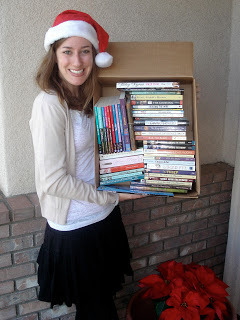 Even in the midst of these difficult financial times, generous individuals responded to our call for books with enthusiasm and compassion. The final donation tally for 2010 was 604 new books, bringing our grand total to nearly 12,000 books! In Ventura, these beautiful new books were distributed to children through the Boys & Girls Clubs on Johnson and Olive streets and Casa Pacifica.
Even in the midst of these difficult financial times, generous individuals responded to our call for books with enthusiasm and compassion. The final donation tally for 2010 was 604 new books, bringing our grand total to nearly 12,000 books! In Ventura, these beautiful new books were distributed to children through the Boys & Girls Clubs on Johnson and Olive streets and Casa Pacifica.
Special thanks to Linda Brug at Ventura High School, Lynne & Clyde Hoffland at Cabrillo Middle School, Rima Muna, Shiela Strayer, Raeanne Alliapoulos, and Positive Imaging publishing company for their donations of beautiful new books.
There is a common adage: "Life is an echo. What you send out, you get back." For the ninth year in a row, we made a big difference by sending out comfort, compassion and hope to underprivileged children. Each new book donated is a seed of learning that helps brighten a life. Indeed, together we changed many lives this holiday season — lives that, I have no doubt, will in turn send out beautiful echoes to others.
 Even in the midst of these difficult financial times, generous individuals responded to our call for books with enthusiasm and compassion. The final donation tally for 2010 was 604 new books, bringing our grand total to nearly 12,000 books! In Ventura, these beautiful new books were distributed to children through the Boys & Girls Clubs on Johnson and Olive streets and Casa Pacifica.
Even in the midst of these difficult financial times, generous individuals responded to our call for books with enthusiasm and compassion. The final donation tally for 2010 was 604 new books, bringing our grand total to nearly 12,000 books! In Ventura, these beautiful new books were distributed to children through the Boys & Girls Clubs on Johnson and Olive streets and Casa Pacifica.Special thanks to Linda Brug at Ventura High School, Lynne & Clyde Hoffland at Cabrillo Middle School, Rima Muna, Shiela Strayer, Raeanne Alliapoulos, and Positive Imaging publishing company for their donations of beautiful new books.
There is a common adage: "Life is an echo. What you send out, you get back." For the ninth year in a row, we made a big difference by sending out comfort, compassion and hope to underprivileged children. Each new book donated is a seed of learning that helps brighten a life. Indeed, together we changed many lives this holiday season — lives that, I have no doubt, will in turn send out beautiful echoes to others.
Published on January 04, 2011 11:47
December 31, 2010
Happy New Year!
Wow, it is crazy how fast this year has flown by. I can't believe we're welcoming in 2011 in a matter of hours!
For me, New Year's Eve is always a time to reflect on the old year and prepare for the new one. I love this quote from Jim Rohn: "Discipline is the bridge between goals and accomplishment." That is so true, and great motivation when striving after your goals day by day.
 Here are some of my highlights from 2010:
Here are some of my highlights from 2010:
Thanks to the generous support of many people who cast their votes for Write On, I was named one of four national winners in the Glamour Magazine/Sally Hansen "Best of You" contest. The prize included a trip to NYC, a makeover and a photo shoot for the magazine! I felt like Cinderella at the ball. This truly was a once-in-a-lifetime experience. Thank you again for making it happen! I took a cross-country road trip with my mom as part of my big move to Indiana to pursue my M.F.A. in Fiction at Purdue University. In addition to taking my own classes I also teach freshman composition and serve as Editorial Assistant of Sycamore Review. My first semester was a whirlwind of activity, and I feel I have already learned a great deal. Teaching was especially rewarding! I love my new life in Indiana, but it has also made me appreciate my California roots (and our glorious warm weather!) a lot more. I started my youth publishing company, Write On! Books: http://www.writeonbooks.org/writeonbooks.aspx. The first Write On! Books anthology, Dancing With The Pen, will be released in early 2011 and features stories, essays, and poetry by more than 60 young writers from all across the U.S. and even abroad. It has been such a pleasure to work with these talented, creative, insightful kids and teens, and I could not be more excited or proud of this book.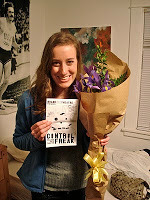 My one-act play "The Stars in Illinois" was produced by Brand New Theater at the University of Southern California. My short story "DING!" was published on Bartleby-Snopes and subsequently nominated for a Pushcart Prize and the Dzanc Books "Best of the Web" anthology. More than two dozen of my stories and essays appeared in a variety of online and in-print publications, including two Chicken Soup for the Soul books. My short stories are archived here: http://www.fictionaut.com/users/dallas-woodburn
My one-act play "The Stars in Illinois" was produced by Brand New Theater at the University of Southern California. My short story "DING!" was published on Bartleby-Snopes and subsequently nominated for a Pushcart Prize and the Dzanc Books "Best of the Web" anthology. More than two dozen of my stories and essays appeared in a variety of online and in-print publications, including two Chicken Soup for the Soul books. My short stories are archived here: http://www.fictionaut.com/users/dallas-woodburn
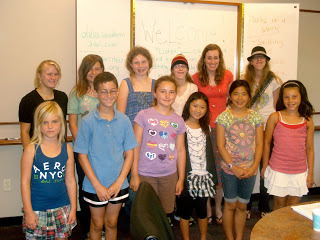 I organized and taught the third-annual Write On! Summer Writing Camp for young writers in Ventura, and had a blast as always. This year I also taught a series of creative writing workshops to senior citizens at Cypress Place Senior Living Center, which was wonderful. I was a featured guest speaker at the Ventura Book Festival, the Southern Expressions Writers Conference in Mississippi, the USC Associates 50th Anniversary Gala, and the American Association of University Women Spring Luncheon. I met so many fantastic people who became new friends. I was also a guest on a variety of radio shows and spoke to community organizations and schools.
I organized and taught the third-annual Write On! Summer Writing Camp for young writers in Ventura, and had a blast as always. This year I also taught a series of creative writing workshops to senior citizens at Cypress Place Senior Living Center, which was wonderful. I was a featured guest speaker at the Ventura Book Festival, the Southern Expressions Writers Conference in Mississippi, the USC Associates 50th Anniversary Gala, and the American Association of University Women Spring Luncheon. I met so many fantastic people who became new friends. I was also a guest on a variety of radio shows and spoke to community organizations and schools.
Another thing to keep in mind when setting goals is to be cognizant of all areas of your life. As Coach Wooden said, "The two most important words in the English language are love and balance." With that in mind, I like to break up my goals into different sections. Here are some of my goals for 2011:
Writing Goals
Write every day.Complete new novel manuscript.Submit to a literary magazine every other week.Write a three-act play.Read at least half an hour every day.Write a blog post twice a week.Write On! Goals
Send out a newsletter every month.Promote Dancing With The Pen.Be a guest speaker at 8 schools/organizations.Create a Write On! DVD. Start a Holiday Book Drive at Purdue.Healthy Life Goals
Exercise three days a week. Learn to cook 10 new healthy recipes.Plant a garden.Do at least one act of kindness every day.Study the Pyramid of Success and keep a journal of inspiring quotes.Count my blessings every night.
Something I am trying for the first time this year is breaking down my year-long goals into month-by-month goals. It helps me get a handle on more daunting projects by planning out how I want to move forward month by month. For example, one of my writing goals is to finish the current novel manuscript I am working on. I have a goal of writing a certain number of pages every month. I am also a believer in daily to-do lists -- it feels so good to cross things off my list! -- but I think month-by-month goals are more flexible for those inevitable times when life gets crazy. For example, maybe I won't be able to write much for a few days during midterms, but then I can make up for it the next week and still be on track for my monthly writing goal.
What are your goals for 2011? How will you make them happen?
I'll close with another of my favorite quotes from Coach Wooden: "The journey is better than the inn." Here's wishing you a masterpiece of a journey in 2011!
For me, New Year's Eve is always a time to reflect on the old year and prepare for the new one. I love this quote from Jim Rohn: "Discipline is the bridge between goals and accomplishment." That is so true, and great motivation when striving after your goals day by day.
 Here are some of my highlights from 2010:
Here are some of my highlights from 2010:Thanks to the generous support of many people who cast their votes for Write On, I was named one of four national winners in the Glamour Magazine/Sally Hansen "Best of You" contest. The prize included a trip to NYC, a makeover and a photo shoot for the magazine! I felt like Cinderella at the ball. This truly was a once-in-a-lifetime experience. Thank you again for making it happen! I took a cross-country road trip with my mom as part of my big move to Indiana to pursue my M.F.A. in Fiction at Purdue University. In addition to taking my own classes I also teach freshman composition and serve as Editorial Assistant of Sycamore Review. My first semester was a whirlwind of activity, and I feel I have already learned a great deal. Teaching was especially rewarding! I love my new life in Indiana, but it has also made me appreciate my California roots (and our glorious warm weather!) a lot more. I started my youth publishing company, Write On! Books: http://www.writeonbooks.org/writeonbooks.aspx. The first Write On! Books anthology, Dancing With The Pen, will be released in early 2011 and features stories, essays, and poetry by more than 60 young writers from all across the U.S. and even abroad. It has been such a pleasure to work with these talented, creative, insightful kids and teens, and I could not be more excited or proud of this book.
 My one-act play "The Stars in Illinois" was produced by Brand New Theater at the University of Southern California. My short story "DING!" was published on Bartleby-Snopes and subsequently nominated for a Pushcart Prize and the Dzanc Books "Best of the Web" anthology. More than two dozen of my stories and essays appeared in a variety of online and in-print publications, including two Chicken Soup for the Soul books. My short stories are archived here: http://www.fictionaut.com/users/dallas-woodburn
My one-act play "The Stars in Illinois" was produced by Brand New Theater at the University of Southern California. My short story "DING!" was published on Bartleby-Snopes and subsequently nominated for a Pushcart Prize and the Dzanc Books "Best of the Web" anthology. More than two dozen of my stories and essays appeared in a variety of online and in-print publications, including two Chicken Soup for the Soul books. My short stories are archived here: http://www.fictionaut.com/users/dallas-woodburn
 I organized and taught the third-annual Write On! Summer Writing Camp for young writers in Ventura, and had a blast as always. This year I also taught a series of creative writing workshops to senior citizens at Cypress Place Senior Living Center, which was wonderful. I was a featured guest speaker at the Ventura Book Festival, the Southern Expressions Writers Conference in Mississippi, the USC Associates 50th Anniversary Gala, and the American Association of University Women Spring Luncheon. I met so many fantastic people who became new friends. I was also a guest on a variety of radio shows and spoke to community organizations and schools.
I organized and taught the third-annual Write On! Summer Writing Camp for young writers in Ventura, and had a blast as always. This year I also taught a series of creative writing workshops to senior citizens at Cypress Place Senior Living Center, which was wonderful. I was a featured guest speaker at the Ventura Book Festival, the Southern Expressions Writers Conference in Mississippi, the USC Associates 50th Anniversary Gala, and the American Association of University Women Spring Luncheon. I met so many fantastic people who became new friends. I was also a guest on a variety of radio shows and spoke to community organizations and schools. Another thing to keep in mind when setting goals is to be cognizant of all areas of your life. As Coach Wooden said, "The two most important words in the English language are love and balance." With that in mind, I like to break up my goals into different sections. Here are some of my goals for 2011:
Writing Goals
Write every day.Complete new novel manuscript.Submit to a literary magazine every other week.Write a three-act play.Read at least half an hour every day.Write a blog post twice a week.Write On! Goals
Send out a newsletter every month.Promote Dancing With The Pen.Be a guest speaker at 8 schools/organizations.Create a Write On! DVD. Start a Holiday Book Drive at Purdue.Healthy Life Goals
Exercise three days a week. Learn to cook 10 new healthy recipes.Plant a garden.Do at least one act of kindness every day.Study the Pyramid of Success and keep a journal of inspiring quotes.Count my blessings every night.
Something I am trying for the first time this year is breaking down my year-long goals into month-by-month goals. It helps me get a handle on more daunting projects by planning out how I want to move forward month by month. For example, one of my writing goals is to finish the current novel manuscript I am working on. I have a goal of writing a certain number of pages every month. I am also a believer in daily to-do lists -- it feels so good to cross things off my list! -- but I think month-by-month goals are more flexible for those inevitable times when life gets crazy. For example, maybe I won't be able to write much for a few days during midterms, but then I can make up for it the next week and still be on track for my monthly writing goal.
What are your goals for 2011? How will you make them happen?
I'll close with another of my favorite quotes from Coach Wooden: "The journey is better than the inn." Here's wishing you a masterpiece of a journey in 2011!
Published on December 31, 2010 11:00
December 21, 2010
Writing is Like Rock-Climbing
 A few weeks ago, I went rock-climbing for the first time. I am a tad scared of heights, so I was nervous as I gazed up at the rock-climbing walls around the gym. I slipped on the harness and learned the basics of belaying. When it was my turn to climb, nerves made my legs shaky. But I hoisted myself up onto the wall, and made it to the top. What elation! I was hooked.
A few weeks ago, I went rock-climbing for the first time. I am a tad scared of heights, so I was nervous as I gazed up at the rock-climbing walls around the gym. I slipped on the harness and learned the basics of belaying. When it was my turn to climb, nerves made my legs shaky. But I hoisted myself up onto the wall, and made it to the top. What elation! I was hooked.In many ways, rock-climbing reminded me a lot of writing. Here are some things writers could learn from climbers:
1. For me, the first step up onto the wall was the hardest. I had to force myself onward. But once I did, it wasn't so bad. The same goes for writing. Often getting started is the hardest part. Force yourself to close out your email, open up that Word document, place your fingers on the keyboard, and just start writing.
2. Don't let the size of your project intimidate you; focus on one step at the time. The first wall I climbed, I didn't make it all the way to the top. A little more than half-way up, my arm muscles already burning, I made the mistake of looking up at how much farther I had to go. I felt I had gone so far already -- yet there was still such a long ways to climb! I defeated myself. Similarly, if I think about the entirety of the novel I am working on, I quickly feel overwhelmed. "Another 200 pages?" I'll think. "There's no way I can do it!" Instead, I focus on writing three pages a day. I have an idea of the novel's broader scope, but I don't let myself worry about the immensity of the task I've undertaken. On a single day, if I write my three pages, I'm good to go. Three pages, three pages, three pages. Little by little, they add up into a book.
3. When rock-climbing, you're strapped into a harness, and someone below is your belayer, whose job is to make sure you don't fall. Trust is essential. As a writer, it's crucial to have a trusted group of readers who give you honest feedback on your work. And it's equally important to have a support system of people you can count on to cheer you on and buoy you up -- because everyone slips and falls sometimes. The important thing is to brush yourself off and attack that wall again.
 4. Venture beyond your self-imposed limits. With my fear of heights, I never thought I would be someone who liked rock-climbing -- but if I had let my fear stop me, I would have missed out on a really fun experience! Pushing yourself is how you grow, both as a person and as a writer. Challenge yourself to write about something that scares you. Write something that makes you uncomfortable. Write something raw and real. Refuse to confine or label yourself.
4. Venture beyond your self-imposed limits. With my fear of heights, I never thought I would be someone who liked rock-climbing -- but if I had let my fear stop me, I would have missed out on a really fun experience! Pushing yourself is how you grow, both as a person and as a writer. Challenge yourself to write about something that scares you. Write something that makes you uncomfortable. Write something raw and real. Refuse to confine or label yourself.5. Enjoy the journey. For me, the most rewarding part of climbing was not when I reached the top, but rather the actual act of stretching for new holds, feeling my muscles strain as I pushed myself to climb higher and higher up the wall. Now, I try more than ever to savor the act of writing. Losing myself in a story, spending hours exploring the crevices of my imagination, spilling my thoughts and emotions onto the page, and then being able to share what I've written with others -- what a gift!
Best wishes on all your writing and climbing journeys!
Published on December 21, 2010 17:01



